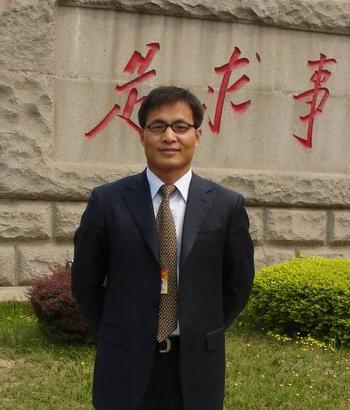Prof. Dr. Laike Yang

Ostasiatisches Seminar
Sinologie - Chinastudien
Gastprofessor
Fachbereich Geschichts- und Kulturwissenschaften
Sinologie - Chinastudien
Fabeckstraße 23-25
14195 Berlin
Prof. Laike Yang who holds a position as FU guest professor until the end of the winter semester 2019/20 is full-time Professor in East China Normal University, Shanghai where he heads the Department of International Trade.
Professor Yang holds a Ph.D. in economics from Xiamen University. He conducted his post-doctoral research in Chinese Academy of Social Science (CASS). His main field of research is “Trade and Environment”, with a focus on Global value chain, trade structure and CO2 emissions. He has published over 50 articles in Chinese and international peer reviewed journals and several books in last two decades.
Professor Yang was awarded key research projects including China’s National Research Fund for Social Science (2011 and 2016), as well Research Funds from Ministry of Education (2010 and 2013). His book on “Estimation of CO2 embodied in China’s Foreign Trade” was selected as “Best Academic Achievement 2018” (First Prize in Book Category). He has engaged actively in international cooperation in his field of research. This includes research with and teaching at universities including Tilburg University (Netherlands), New York University (USA), Emlyon (France), Corvinus University (Hungary), Campinas University (Brazil), Kyoto University (Japan), Makerere University (Uganda), University of Dar es Salaam (Tansania). He is acting as the ECNU focal point for the Council for International Education (CIEE) from the USA and has served as China Coordinator for the DAAD project on Comparative Economic Development Studies.
Education:
| 2001 Mar.- Aug. |
Berlin School of Economics and Law, Advanced Training program “Macroeconomics & Monetary Policy”, Germany |
| 1998 Jan.- July |
Tilburg University, “Advanced Training Program on Micro-economics” Co-organized by Chinese Ministry of Education and Dutch Ministry of Culture and Education, Netherlands |
| 1997 - 2000 |
Ph.D Economics., Xiamen University |
| 1991 - 1994 |
M.A. Economics, Shaanxi Normal University |
| 1987 - 1991 |
B.A. Economics, Shaanxi Normal University |
Employment:
| 2004 – present | Professor in Economics, Dean of Department of International Economics, East China Normal University, Shanghai |
| 2019.4-2020.3 | Guest professor, Free University of Berlin |
| 2002 – 2004 |
Post-Doctor Research Fellow, Chinese Academy of Social Sciences (CASS), Beijing |
| 2000 – 2002 |
Associate Professor, Dean of Department of Economics, Guangdong University of Economics & Finance, Guangzhou |
| 1994 - 1999 |
Lecturer, Department of Economics, Guangdong University of Economics & Finance, Guangzhou |
Teaching and Thesis Supervising:
Courses taught in English:
-
China Global Economic Impact (MA)
-
Chinese Economy: Reform Transition and Development (BA/MA)
-
Asian Business Environment (MA)
-
Seminars on Chinese Economy (MBA, EMBA)
-
Seminars on Economic Development (BA/MA)
Courses taught in Chinese:
-
Trade and Environment (Ph.D/MA)
-
International trade (BA)
-
Trade payments and settlements (BA )
Thesis supervision:
-
Ph.D. supervisor since 2007
-
MBA thesis supervisor since 2008
-
MA supervisor since 2001
Additional Teaching/International Experience:
| 2015.June | Visiting professor in Berlin University of Applied Science |
| 2007- 2018 | Adjunct professor, EM-Lyon Business School (Asia Campus) |
| 2007-present | Adjunct professor, Council of International Education Exchange (CIEE, USA). |
| 2010 July | Visiting professor, Dar es Salaam University, Tanzania and Makerere University, Business School, Uganda |
| 2011- present | Adjunct professor, New York University (Shanghai). |
| 2011 April-May | Visiting professor in Corvinus University of Budapest, Hungary. |
Academic Honours:
-
Best academic achievement in Social Science 2016-2018. First Grade (book category). Shanghai Municipality Government.
-
Teacher of the year award, East China Normal University, 2017, 2013, and 2010
-
Award for leading professor of EMLYON, Asian Campus, 2008 and 2009
-
Teacher of the year award, School of Finance and Statistics, East China Normal University, 2008
-
Awarded best post-doctorate researcher, Chinese Academy of Social Science (CASS), 2007
-
Award of best BA thesis supervisor, East China Normal University, 2006
-
Award for best teaching Professor, Guangdong Business College,1996 and 2000.
-
Award for best research (PhD) student, XiaMen University,1999.
Research Grants and Projects:
-
“Global Value Chain, Trade-embodied Emissions and Climate Change”, China National Research Fund for Social Science (key project), 2016-2020.
-
“Trade embodied CO2 emissions of China: trend and estimation”, China National Research Fund for Social Science, 2011-2014.
-
“Environmental Impact of China’s Foreign Trade”, Social Science Grant of Ministry of Education, 2010-2013.
-
“Trade and Climate Change: China’s Perspective”, Social Science Grant of Shanghai Municipal Government, 2010-2013.
-
“ WTO and Global Warming: Impact on and Policy Implication to China”, Grant from Chinese Ministry of Commerce, 2008.
-
“Fiscal Policy of Shanghai toward a World Financial Centre”, Grant from Shanghai Municipal Government, 2008.
-
“Development Strategy for Service Sector in Minhang District of Shanghai”, Grant Minhang District Government, 2007.
-
“China’s Large Enterprises(Group) Development”, Grants from the Development Research Centre of the State Council, 2002, 2003, 2004, 2005, 2006, 2007, 2008, 2009, 2010 and 2011.
-
“Multinational Companies and the Technology Development in China”, Research program China Academy of Social Science, 2004.
-
“The Service Sectors in China after WTO Accession”, Research program Chinese Academy of Social Science, 2001.
-
“How to Push FDI to Central and Western China”, Joint-Research Project Chinese Academy of Social Science and Ministry of Commence of China, 2002.
Cooperative Projects
-
DAAD Project “Comparative Economic Development Studies”
(2009-2012, 2012-2015, 2015-2018) ,China Coordinator.
-
“Internationalising of the Zhongguangcun High-tech Park”, Project of Beijing Zhongguangcun High-Tech Park, 2001-2004. Project coordinator.
Books:
-
Trade embodied CO2 emissions in China, Shanghai People’s Press, 2017.
-
International Payment and Settlement (Textbook), ECNU Press, 2012.
-
International Payment and Settlement (Textbook), Shanghai Lixin Publishing House, 2007.
-
Aggregate Demand Shortage and Deflation in China, GuangDong Publishing House, 2002.
-
Knowledge-Based Economy and Economic Globalization, Guangdong Tourism Press, 1999.
Books Chapters:
-
Production Sharing in East Asia: China’s Position, Trade Pattern and Technology Upgrading, in “Rethinking Development Strategies after the Financial Crisis ”,Vol 2. 57-69. UNCTAD, 2016, New York and Geneva.
-
Global Financial Crisis and Its Impacts on China’s Foreign Trade, in “The Financial and Economic Crisis of 2008-2009 and Developing Countries”, UNCTAD, 2010, New York and Geneva, 119-148.
-
“Fiscal Policy to Promote Shanghai’s Competitiveness as an International Financial Center”. In Shanghai Financial Development Report, Shanghai Publishing House, 2009.
-
“Globalization and China’s Service sectors”. In Globalization and China’s Trade Policy , Economy & Management Publishing House, Beijing, 2004.
-
“R&D Globalization and technology spillovers”. In Restructure of technology resource and promote and technology competitiveness of Chinese industry in the era of globalization. Chinese Social Science Publishing House, Beijing, 2004.
-
“Adjustment of Trade Policy of Developing Countries in the Era of Globalization”. In Research Work of Post-Doctoral Scholars. Chinese Social Science Publishing House, Beijing 2004.
Research Papers:
-
Is Improvement of A Country’s Position on Global Value Chain Reduces its CO2 Emissions? Journal of Resource Science, 2020 (1) Forthcoming.
-
Global Value Chain and Sino-US trade: Balance and Structure Analysis. Asia and Pacific Studies (亚太经济), 2019 (1), 22-32.
-
Global Value Chain, China’s Position and Climate Change, Paper presented in DAAD Workshop on “Trade and Development”, Delhi, India, 2018 Sept.
-
Servitization of manufacturing industry and emission reduction, International Economics and Trade Research(国际经贸探索), 2018, 34 (07):35-48.
-
Export Structure Decomposition and Competitiveness Measurement of BRICS Exports in Global Value Chain. Journal of Chongqing University (重庆交通大学学报)(Social Science Version), 2018, 18(6): 89-96.
-
Export Structure,Product Sophistication and Carbon Emission from China's Manufacturing Sectors--Under the Perspective of Global Value Chain. Industrial and economic Review(产经评论), 2017, 8( 03) : 5 -17.
-
China’s Position in Global Value Chain: Evaluation and Policy Implication, Journal of Guanxi University(广西大学学报), Vol. 38 (03), 2016. 95-100.
-
Trade dependency of China and India: a Global Value Chain perspective. Industial and Economic Review(产经评论). 2016,7 (01):126-131.
-
The impact of Vertical specialization on China’s embodied carbon emissions: an inter-temporal MRIO-SDA analysis. Journal of Resources Science(资源科学). 2016, 38(9):1801-1809.
-
East Asian Vertical Specialization, Trade Segmentation and China's Embodied CO2 Emissions, Industrial and Economic Review(产经评论). 2015. 6(2), 96-102.
-
East Asian Economic Growth, Openness and Emission Efficiency. Forum of World Economics and Politics (国际经济与政治论坛), 2015 (3), 134-149
-
Research on Monopsony Effect of International Carbon Emissions Trading:An Example of Import Control in Annex B Countries. Contemporary Finance and Economics(现代财经). Vol. 367(5), 2015. 97-106.
-
Revisit of China-Japan Trade from Value-Added Perspective. Economic Issues Explore(经济问题探索). Vol. 283 (5), 2015. 99-105.
-
A panel data analysis on Investment, industrial structure and urbanization and CO2 emissions in China: A comparison of FDI and domestic investment. Journal of East China Normal University(华东师范大学学报). Vol.308, April. 2014.
-
Urbanization, Growth and Climate Change: An empirical analysis based on provincial panel data in China, Modern Finance and Economy(现代财经), Vol. 283, Aug. 2013.
-
FDI、export and CO2 emissions in China, International Trade issues (国际贸易问题), Vol. 370, Oct. 2013.
-
“Trade, CO2 Emissions and Industrial structure in China”, World Economy Study (世界经济研究), Vol. 221, July, 2012.
-
“Theory and Empirical Study on Pollution Haven Hypothesis”. Journal of Business Economics (商业经济管理), Vol. 246, April, 2012.
-
“China’s Foreign Trade and Climate Change” (in English), Energy Policy, Vol. 38, Jan. 2010, pp 350-356
-
Sino-EU trade and Global Warming. International Journal of Social Ecology and Sustainable (in English). Vol. 1, 2010. May. ISSN: 1947-8402
-
CO2 Emissions Embodied in China–U.S. Trade, the Chinese Journal of Population, Resources and Environment (in English), 2009 Vol. 7, No.3.
-
The Driver of China’s Growing CO2 Emissions: A Structural Decomposition Analysis, Contemporary Finance(当代财经), 2010 No.1
-
“US FDI in China Has Widened the China-U.S Trade Surplus“(in English), China Economists, No. 8, May 2007. The Chinese version of the paper is published in Southeast Asia Study, 2009, (7):72-75.
-
“A Study of the Gradual Shift of Foreign Investment” (in English). The Chinese Economy, September-October 2004/VOL.37, NO.5.
-
“Trade Effects of East Asian FDI in China”, Journal of world economy study(世界经济研究), No.157, March 2007.
-
“The competitive environment of Chinese manufacturing industry after WTO accession”, Finance and Trade economics(财贸经济), April 2004.
-
“Service Sectors in China After WTO Accession”, Journal of Shanxi University of Economics and Finance(山西财经大学学报), Issue 5th, 2002.
-
“What Causes the Low Level Supply Surplus in China?”Economic Journal of Heilongjiang University(求是学刊), issue 1st, 2001.
-
“The Particularity of Demand Shortage in China in Recent Years”, Research On Economics And Finance(财经研究), Issue 7th, 2001.
-
“The Monetary Policies in China since the Mid Of 1990s---Experiences, Problems and Future Operational Direction”, Economic Perspectives(经济纵横), issue 7th, 2000.
-
“The Macro Management in the Procedure of Mercerisation in China”,Journal of Central University of Economics and finance(中央财经大学学报), issue 2nd, 2000.
-
“Analysis of Current Fiscal Policies of Chinese Government”, South China Economic Journal, issue 7, 2000.
-
“On Business Cycle of China Since the Beginning of Economic Reform”,Research on Economics and Finance(财经研究), issue 12th, 1999.





